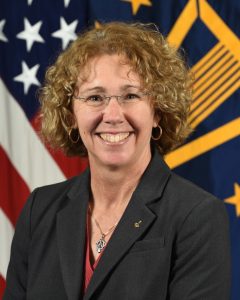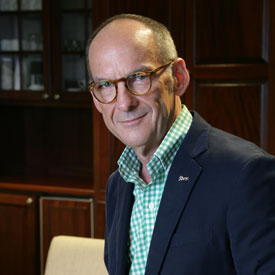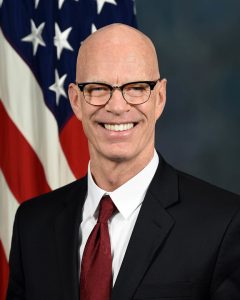EVENT DETAILS
This two-day event unites the government, industry, and university systems engineering research community in order to share research progress and discuss the most challenging systems engineering issues facing the Department of Defense (DOD) as well as other federal departments and agencies.
LOCATION
Washington, DC 20009
DAY 1 | 9:30 AM – 6:00 PM
SYSTEMS THINKING WORKSHOP
SystemiTool is a systems thinking method and tool for mapping complex systems using “Systemigrams.” This workshop will introduce the newly updated SystemiTool, as well as a look back over the past 30 years at systems thinking and Systemigrams.
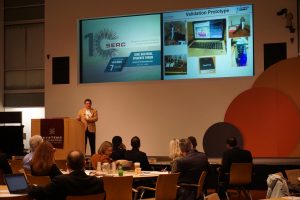
SERC DOCTORAL STUDENTS FORUM
The SERC Doctoral Students Forum (SDSF) provides an opportunity for SERC Doctoral Fellows and other doctoral students conducting highly relevant, systems engineering-related research at any of the SERC collaborating universities to present their research in an open forum.
Day 1 will come to a close with an Evening Reception at 6:00 pm
DAY 2 | 8:00 AM – 5:00 PM
SERC SPONSOR RESEARCH REVIEW
The SSRR program and sessions focus on the latest research results from SERC researchers aligned with emerging and critical sponsor research needs.
Program tracks include:
- Mission Engineering
- Digital Engineering Transformation
- AI/Autonomy and Systems Engineering
- System Security Engineering
- System Engineering for Velocity
- Human Capital Development
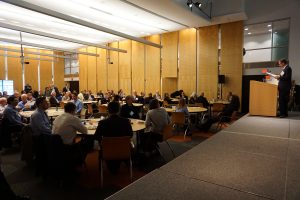
SPEAKERS
Dr. Sandra H. Magnus
Deputy Director for Engineering within the Office of the Under Secretary of Defense for Research and Engineering
Dr. Sandra H. “Sandy” Magnus is the Deputy Director for Engineering within the Office of the Under Secretary of Defense for Research and Engineering. She serves as the DoD’s Chief Engineer for Advanced Capabilities. In this role, she is the lead for engineering policy, practice, and the DoD engineering workforce, as well as digital engineering and systems of systems engineering initiatives. She leads mission integration management, independent technical risk assessments, and program planning and execution.
Dr. Magnus is a recipient of the NASA Space Flight Medal and the NASA Exceptional Service Medal, among other awards.
Dr. Magnus received a bachelor of science in physics and a master of science in electrical engineering from the Missouri University of Science and Technology. She received a Ph.D. in engineering from the School of Materials Science and Engineering at Georgia Institute of Technology in 1996.
Dr. Kenneth M. Ford
Founder and Chief Executive Officer, Florida Institute for Human & Machine Cognition (IHMC)
Kenneth Ford is Founder and Chief Executive Officer of the Florida Institute for Human & Machine Cognition (IHMC) — a not-for-profit research institute located in Pensacola, Florida. IHMC has grown into one of the nation’s premier research organizations with world-class scientists and engineers investigating a broad range of topics related to building technological systems aimed at amplifying and extending human cognition, perception, locomotion and resilience. Richard Florida has described IHMC as “a new model for interdisciplinary research institutes that strive to be both entrepreneurial and academic, firmly grounded and inspiringly ambitious.” IHMC headquarters are in Pensacola with a branch research facility in Ocala, Florida.
Dr. Wouter Leibbrandt
Science and Operations Director of ESI
Wouter Leibbrandt is Science and Operations Director of ESI, an industry and academia sponsored research center hosted by TNO. ESI focusses on the development of novel methodologies, often model-based, for design and engineering of increasingly complex high-tech (embedded) systems. It does so in strong partnership and close collaboration with leading high-tech companies such as ASML, Philips, Thales, NXP, Océ, Thermo-Fisher and Nexperia as well as with leading academic groups in the Netherlands and across Europe. Themes are: digital twin, big data in high-tech systems, impact of AI and systems of systems.
Until early 2016 Wouter was with NXP Semiconductors for 10 years, where he managed the Advanced Applications Lab, investigating new application concepts around future advanced silicon products, driving secure connections for a smarter world. Before joining NXP, he was with Philips Research labs for 14 years, managing a variety of projects and departments. From 2004 to 2006 he lived and worked in China, at the Philips Research labs in Shanghai.
He serves in advisory roles to several academic departments and curricula and is on the steering board of the European ARTEMIS Industry Association. Wouter holds a PhD in physics from Utrecht University.
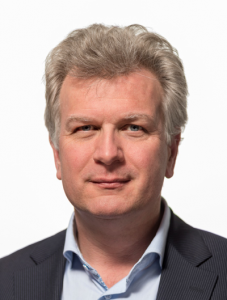
PANELISTS
Dr. Thomas Karr
Assistant Director of Directed Energy – OUSD (R&E), DoD (invited)
Dr. Thomas Karr is the Assistant Director, Directed Energy in the Office of the Undersecretary of Defense (Research and Engineering). His responsibilities cover all Directed Energy research and development in the Department of Defense.
He has four decades of experience in the application of science to national security. Prior to joining OUSD(R&E) he was a DARPA program manager for six years, where he created new programs for kinetic and non-kinetic effects, communication, information processing and exploitation, and intelligence, surveillance, and reconnaissance. He was the Director of EO/IR Technology at Raytheon Space and Airborne Systems and at Northrop Grumman, and was a Group Leader, Program Leader and senior scientist at Lawrence Livermore National Laboratory for twelve years. He also co-founded a commercial space company, and consulted for many companies in the national security industry.
He earned his A.B. cum laude in Physics from Princeton, his Ph.D. in Physics from the University of Maryland, and was a Joliot-Curie Fellow of the Atomic Energy Commission of France. He has published over 50 scientific papers, serves on the Organizing Committees of three scientific conferences, holds three patents, and he is a Fellow of the Military Sensing Symposia (MSS), the Society of Photo-Optical Instrumentation Engineers (SPIE), and the Optical Society of America (OSA).
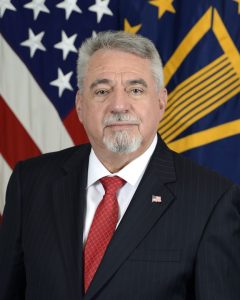
Dr. Daniel Ragsdale
Assistant Director for Cyber, OUSD (R&E), DoD (confirmed)
Dr. Daniel “Rags” Ragsdale is the Assistant Director for Cyber, in the Office of the Director of Defense Research and Engineering (Research & Technology). In that role, Dr. Ragsdale is responsible for coordinating cyber modernization efforts across the Department of Defense, with specific responsibility for the establishment of policies and for supervision over cyber modernization research and engineering, technology development, prototyping, experimentation, developmental testing, and transition activities. He is also responsible for making recommendations concerning the allocation of resources and alignment of efforts across the Department.
Before his recent return to service in the Department of Defense, Dr. Ragsdale was the founding director of the Texas A&M Cybersecurity Center and a Professor of Practice in the Department of Computer Science and Engineering. In the Director role, Dr. Ragsdale was responsible for leading, coordinating, and facilitating cybersecurity research and educational activities across the University. Dr. Ragsdale had previously served as a Program Manager in the Defense Advanced Research Projects Agency (DARPA). In that capacity, he successfully led and managed a $175M research and development portfolio of classified and unclassified cybersecurity and educational programs.
Dr. Michael Zatman
Assistant Director for Fully Networked C3, OUSD (R&E), DoD (confirmed)
Dr. Michael Zatman became the Assistant Director for Fully Networked Command, Control and Communications in the Office of the Under Secretary of Defense for Research and Engineering on January 22nd 2019. In that capacity Michael is responsible for leading the Nation’s vision and strategy for networking, command, control and communications to support and enhance the Department’s warfighting capability.
During his career Michael has provided both organizational and technical leadership to the creation, development and fielding of new technologies, the solving of complicated technical problems and the optimization of multi-faceted system and platform concepts. He is a nationally recognized expert in communications, radar, sensor and electronic warfare systems with an extensive knowledge and understanding of ground, sea, air and space based communications, intelligence, surveillance and reconnaissance systems.
Prior to joining the Office of the Undersecretary of Defense for Research and Michael was a fellow at SAZE Technologies from 2012 to 2018. From 2007 to 2012 Michael was Technical Director of QinetiQ North America’s Technology Solutions Group, where he was responsible for technical innovation and competency across a wide range of C4ISR, maritime and transportation projects. Additionally, he was the principal investigator for several new Navy, DARPA, IARPA and Air Force programs. Michael came to QinetiQ North America from DARPA where he spent four years as a Program Manager running programs and studies involving space, airborne and ground-based platforms, radar, communications, signal/electronic/communications intercept, optical sensors, multi-functional structures and quantum theory. Earlier in his career Michael worked at the MIT Lincoln Laboratory where he led multi-organizational & multi-disciplinary teams to design future surface radar, airborne radar and communications systems, developed signal processing algorithms and performed system engineering analysis for Air Force, Navy and MDA radar and communications systems.
Michael has authored over 65 technical publications, two book chapters and received multiple patents. Michael received his PhD and BEng (Hons – 1st Class) degrees from the University of Leeds and was awarded the Office of the Secretary of Defense Medal for Exceptional Public Service in 2007.
LODGING
HOTELS:
- SOLD OUT: Courtyard by Marriott Washington, DC/Dupont Circle
1900 Connecticut Ave NW, Washington, DC 20009
The hotel block at the Courtyard Marriott Dupont Circle has been sold out.
The following hotels are within walking distance of FHI 360 Conference Center; however, there is no guaranteed hotel block.
- The Fairfax at Embassy Row (7 min. walk)
2100 Massachusetts Ave NW, Washington, DC 20008 - The Churchill Hotel (2 min. walk)
1914 Connecticut Ave NW, Washington, DC 20009 - Normandy Hotel (5 min. walk)
2118 Wyoming Ave NW, Washington, DC 20008


